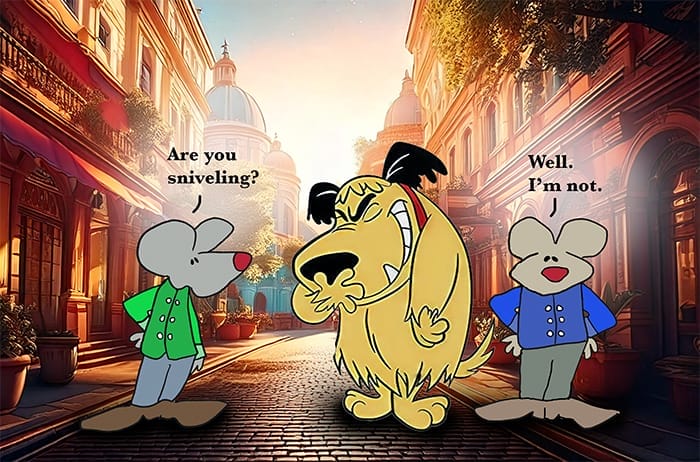What can I tell you about sniveling?
Except sometimes, sniveling gets on my nerves when sniveling is done in a fake way. You know those times. When someone is on the witness stand and they start to snivel about all their problems. Or when a person tells you in person about their wonky woes. In a sniveling sort of way.
Please. Don’t get me wrong. I often feel compassion for those who are experiencing hardships in their lives. But for the people who are making mountains out of molehills? Wellllll…
A good example of this brings me back to the day of the lockdown with COVID. Not much was known about the disease and scientists were still trying to figure out what was safe and what was not. Hence, there was the lockdown to avoid unnecessary transfer of the illness. But a LOT of people out there were sniveling about their rights. They weren’t allowed to go get their weekly manicures and their nails looked horrible. Snivel. Snivel. Or, they weren’t allowed to go get a Big Mac when they wanted to, and they missed that special sauce. Snivel. Snivel.
Oh, buck up. I say. Trim your own nails and paint them. Mix up some mayonnaise and tartar sauce and fry your own hamburger. And get over it.
The hapless snivelers are ruining a perfectly good word, I’ll tell you.
As defined, it goes like this.
snivel | ˈsniv(ə)l |
verb (snivels, sniveling | ˈsniv(ə)liNG |, sniveled | ˈsnivəld |; British English snivels, British English snivelling, British English snivelled) [no object]
cry and sniff in a feeble or fretful way.
• complain in a whining or tearful way.
intransitive verb
1 : to run at the nose
2: to snuff mucus up the nose audibly : snuffle
3: to cry or whine with snuffling
4: to speak or act in a whining, sniffling, tearful, or weakly emotional manner
sniveler
The dictionary goes on to say this”
“There’s never been anything pretty about sniveling. Snivel, which originally meant simply “to have a runny nose,” was probably snyflan in Old English. It’s likely related to sniffle, not surprisingly, and also to an Old English word for mucus, snofl. It’s even related to the Middle Dutch word for a cold, snof, and the Old Norse word for “snout,” which is snoppa. There’s also a connection to nan, a Greek verb meaning “flow.” Nowadays, we mostly use snivel as we have since the 1600s: to refer to self-pitying whining, whether or not such sniveling is accompanied by unchecked nasal flow.”
Back to my assessment of the situation.
So, look at #2. To snuff mucus up the nose audibly. Snuffle.
I look for opportunities in my day to say the word snuffle.
Some people snivel well. Like in a cute way.
Take, for instance, Snagglepuss. Yes. Him. Snagglepuss is known for sniveling. If you don’t remember, he is a pink mountain lion who appeared in various Hanna-Barbera cartoons. Snagglepuss was known for his dramatic speech and his often whiny, sniveling manner.
Do you know what I loved about him most? He was often portrayed as a somewhat cowardly character who would exclaim, “Heavens to Murgatroyd!” and “Exit, stage left!” with a distinct voice that made him memorable for his sniveling tone. Do you know how many times I’ve said “Heavens to Murgatroyd!”
And then there was Muttley. Oh, I loved him too. Muttley is a fictional dog created in 1968 by Hanna-Barbera Productions. Someone at HB must have been married to a sniveler. Anyway, Muttley was the sidekick (and often foil) to the cartoon villain Dick Dastardly. He had a wonderful mischievous, rasping laugh. But he also sniveled.
Like a champion.
I suppose it goes back to the same old thing.
Sniveling, like anything else, has its good merits and bad merits.
There are two sides to everything.
And it makes us better people if we are able to see both. If we are able to step back and take a look at the whole big picture for what it is, whether we like it or not.
Without sniveling.
“””””””””””””””””
“Crying is how your heart speaks when your lips can’t explain the pain you feel.” – Michael White
“””””””””””””””””
“Tears come from the heart and not from the brain.” – Leonardo da Vinci
“””””””””””””””””
“Sadness flies away on the wings of time.” – Jean de La Fontaine
“””””””””””””””””
The sniveling. Unlike the sniffles.
